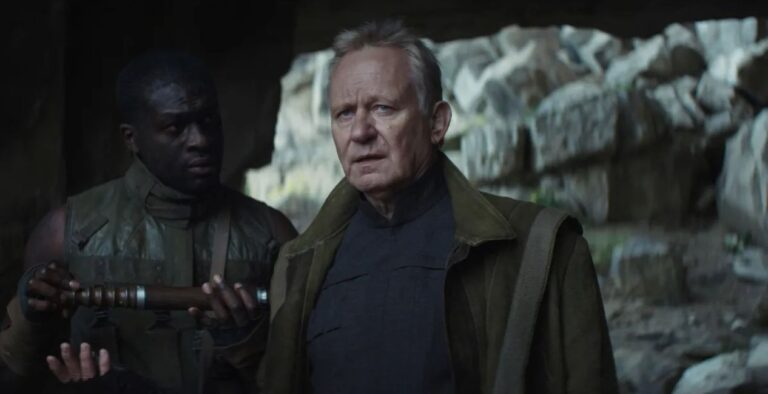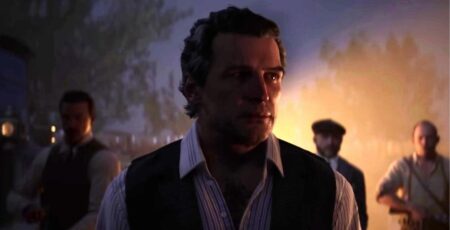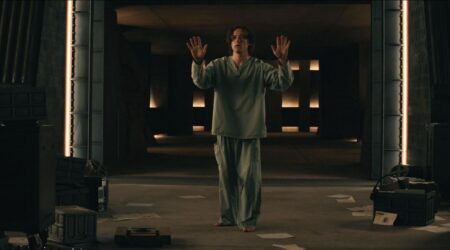In Andor Season 1, Luthen Rael’s line, “I burn my life to make a sunrise I know I’ll never see,” has been celebrated as one of the most powerful quotes in Star Wars history. Stellan Skarsgård‘s performance is dramatic and poetic, and fans are quoting the speech left and right. But here’s the thing: it’s overrated.
While the speech sounds excellent, it doesn’t hold up when you dig deeper. It’s self-indulgent, misrepresents what sacrifice in the Rebellion looks like, and ultimately feels like Luthen Rael is more interested in building his myth than actually embodying the cause.
Luthen’s speech is delivered to Lonni Jung (Robert Emms), an Imperial informant with little power or agency in the Rebellion. He’s not someone who needs convincing or inspiration. In many ways, Lonni is a disposable character—a cog in the larger machine, his role limited to passing on information without any deeper emotional or ideological investment. So why does Luthen Rael choose this moment to deliver such a grand, philosophical statement?
The answer lies in Luthen’s need to mythologize himself. The speech is less about motivating Lonni or sharing wisdom, and more about Luthen Rael indulging in his sense of tragedy. It’s a theatrical outburst to someone who, in the grand scheme of the Rebellion, holds no absolute sway over its direction. It’s a performance, not a conversation, and that diminishes its impact. The actual weight of rebellion comes from the sacrifices of ordinary people, not from speeches designed to sound profound.
Luthen Rael doesn’t define the Rebellion.
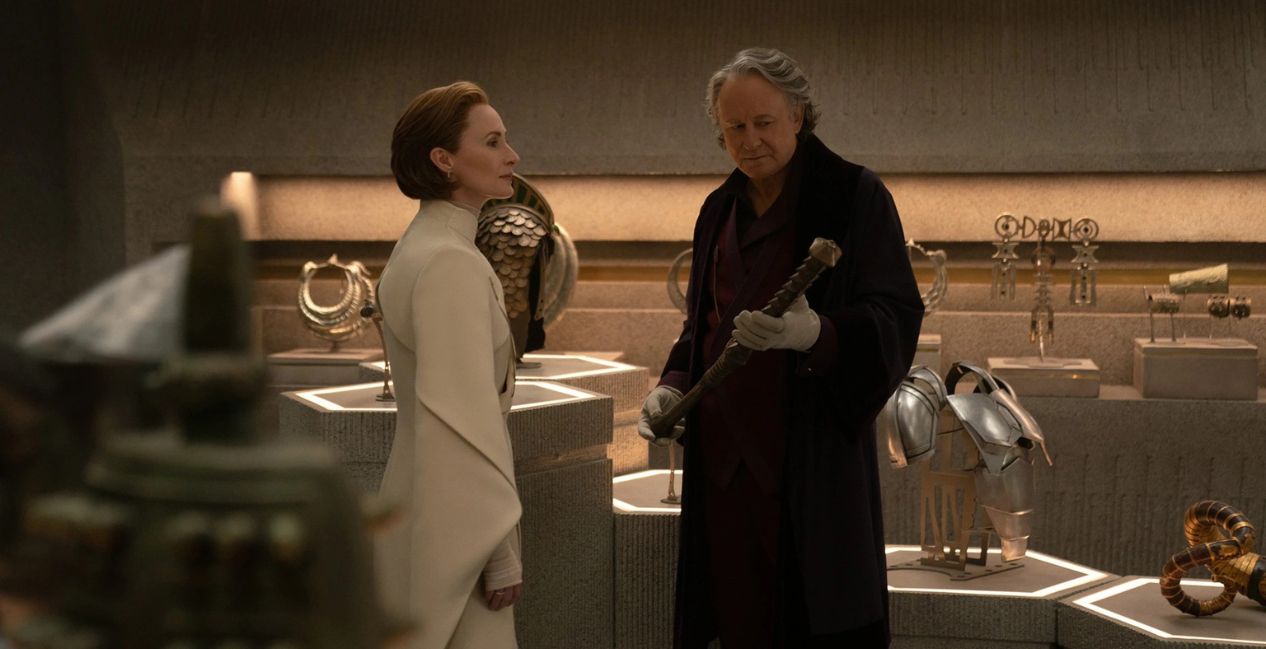
The proper sacrifices of the Rebellion aren’t made by shadowy masterminds like Luthen, but by people like Cassian Andor, Nemik, Maarva, and the inhabitants of Ferrix—individuals who are thrown into the struggle not because they choose it, but because they’re forced to. These characters face unimaginable losses, oppression, and danger, all without the luxury of operating from a secure, privileged position like Luthen.
While Luthen Rael may “burn his life,” he is still, in many ways, a wealthy man with resources, able to choose his path and live relatively unscathed from the true horrors of the Rebellion. On the other hand, Cassian is a man shaped by loss and survival, constantly pushed to fight because of the oppression around him. He and others like him make sacrifices out of necessity, not philosophical grandeur. This is where Luthen’s speech falls short: It elevates his pain and suffering, while glossing over the much more genuine struggles faced by those on the ground. The speech is about him, not the cause.
One of Andor’s greatest strengths is its grounded, realistic portrayal of the Rebellion. The show doesn’t romanticize the fight for freedom or make it about heroic moments and noble sacrifices. Instead, it’s a brutal, collective effort where survival and the will to continue fighting matter most. So, it feels out of place for Luthen’s speech to come across as so polished and rehearsed. It’s almost as if it was written to be shared and quoted, as if it’s a soundbite made for the socials rather than a natural part of the narrative.
Compare it to Nemik’s Manifesto, a more genuine expression of the Rebellion’s ideology. Nemik doesn’t need to glorify his suffering or frame himself as a tragic martyr. Instead, his writing is filled with clear, uncompromising truths about tyranny, resistance, and freedom. He argues that oppression is unnatural and that small acts of defiance weaken the foundations of authoritarian control. That rebellion is inevitable because the people’s will cannot be suppressed forever. Unlike Luthen, whose speech paints the Rebellion as a grim, lonely sacrifice, Nemik believes in hope and a future beyond the fight.
Nemik’s Manifesto, which Cassian listens to after Nemik’s death, is a written philosophy on why rebellion matters. It isn’t performative or meant to impress—it’s a call to action, urging others to recognize that freedom is worth fighting for. Luthen Rael’s speech, however, is almost too self-aware, too constructed, and too perfect for the moment. It feels more like something meant to leave an impression than something that flows from the character’s inner truth. Where Nemik writes for the future, Luthen speaks only for himself.
At its core, Andor is about the collective nature of rebellion.
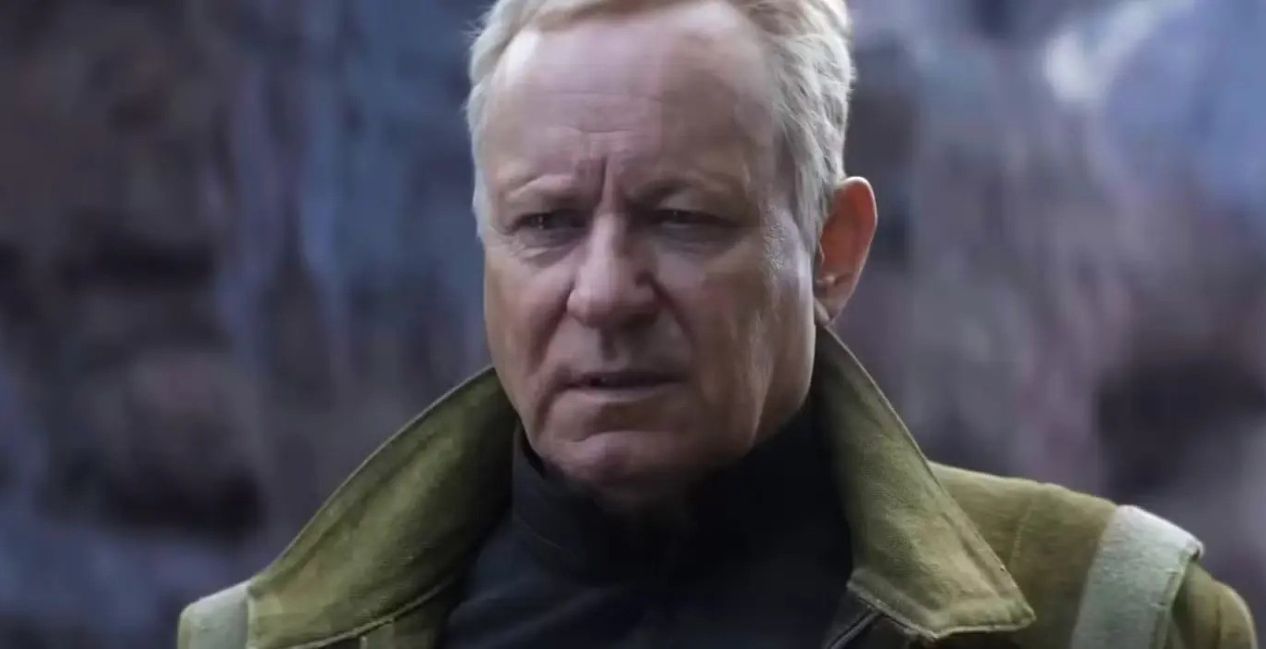
The Rebellion is not about one person sacrificing for the cause. It’s about thousands of nameless, forgotten people who make impossible choices, repeatedly, with no guarantee of success. And yet, Luthen’s speech positions him as though he bears the weight of it all alone. He speaks as if his pain is singular, as if the entire burden of the Rebellion rests on his shoulders—and that feels disconnected from the very essence of Andor.
The reality is that the Rebellion is a collective struggle. There’s no room for individual martyrdom when it’s about the survival of an entire movement. Luthen’s suffering, though real, is a fraction of what others go through. And his insistence on framing himself as the tragic martyr of the cause detracts from the true nature of the Rebellion—the willingness of ordinary people to stand together, to fight together, and to make sacrifices without expecting anything in return.
One of the striking elements of Luthen’s speech is the privilege it subtly reveals. While he speaks of burning his life to make a difference, Luthen Rael remains wealthy, operating from the shadows, untouched by the daily hardships of the Rebellion’s real fighters. This isn’t just about Luthen being out of touch with the true sacrifices of others. It’s a glaring example of privilege in action that mirrors the political realities many of us face today.
The grandstanding in Luthen’s speech feels painfully familiar in today’s world.

In the U.S., we often see politicians and power brokers who, despite having the power to enact change, are the furthest removed from the struggles of the people they claim to represent. Luthen’s speech, with its dramatic flair and self-pity, feels eerily similar to the grandstanding of public figures who use the language of sacrifice while never actually sacrificing anything themselves. Those in power often dominate conversations about change, but the real, invisible fighters continue to struggle.
While Luthen laments his personal toll, he isn’t risking his life on the frontlines of the Rebellion like Cassian or the countless others dying for the cause. His suffering is a choice. Their suffering is thrust upon them. Politicians and elites continue to bask in their comfort while presenting themselves as the champions of those who are suffering. In this sense, Luthen’s speech, while poignant, inadvertently exposes the class divides and the very real dynamics of privilege that often shape the narratives of sacrifice.
Luthen’s role in the Rebellion—operating from a position of power, privilege, and strategic calculation—symbolizes this disconnect. His speech isn’t just a personal lament. It’s also a commentary on how those with the most to lose (or at least the most comfortable lives) can frame themselves as martyrs, while those without such privileges make the actual sacrifices. And in this, Luthen’s character reflects a modern political issue we see all too often—people with power co-opting the story of sacrifice, leaving the real fighters in the shadows, unnamed and unacknowledged.
The Stellan Skarsgård monologue in Andor Season 1 has become one of the most iconic speeches in the Star Wars franchise, but it’s worth asking whether it truly deserves that title. While powerful, Luthen’s words come across as more self-indulgent than meaningful. Though dramatic and poetic, his speech doesn’t align with the true themes of sacrifice and rebellion that Andor so carefully builds. It’s less a reflection of the cause and more of his self-importance.
Ultimately, Luthen’s speech doesn’t define the Rebellion—it merely adds another layer to his myth. And when compared to the sacrifices made by others, it rings hollow. The Rebellion isn’t about one man’s burden. It’s about the collective fight of thousands who give everything they have for a future they’ll never see. That’s the true sacrifice of the Rebellion, and it’s what Andor gets right.
Andor season 1 is now streaming on Disney+. Season 2 will premiere April 22, 2025.

